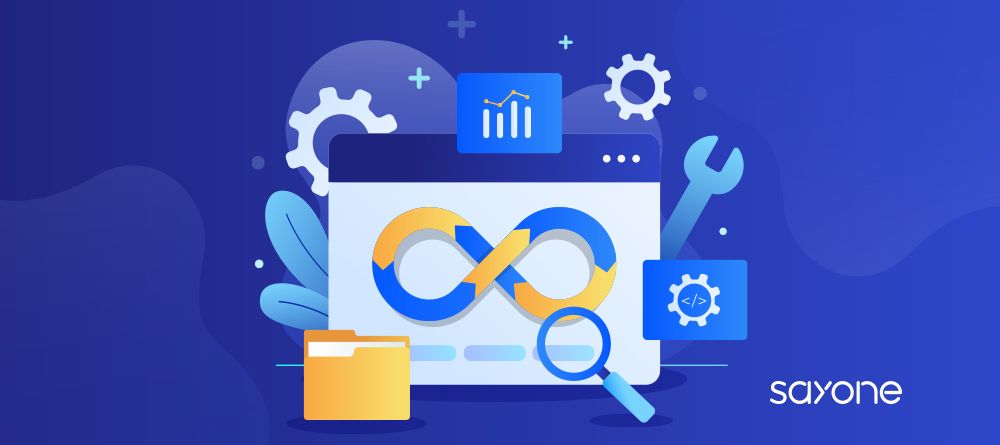
Subscribe to our Blog
We're committed to your privacy. SayOne uses the information you provide to us to contact you about our relevant content, products, and services. check out our privacy policy.

Jibu JamesJuly 31, 202310 min read

Generating table of contents...
DevOps is a collaborative approach that bridges the gap between development and operations teams. They help optimize your current workflow and implement new ones in place. This approach helps foster a seamless software development and delivery process between your company and its end users. DevOps Engineers emphasizes automation, continuous integration, and continuous delivery, enabling faster and more reliable software releases.
DevOps Engineers play a pivotal role in implementing and managing the ‘DevOps culture’ within an organization. They possess a wide range of skills, including automation, coding, and system administration. DevOps Engineers facilitate efficient communication and collaboration between different teams, which helps in a smooth workflow and enables the organization to adapt quickly to market demands.
By outsourcing a DevOps team, businesses can tap the expertise of the engineers who worked in developing different pipelines and workflows. This way, a firm can accelerate its development life cycle process by eliminating unnecessary components & workflows, which improves overall business efficiency. By adopting a DevOps approach, companies can achieve faster time-to-market, enhanced product quality, and increased customer satisfaction.
DevOps engineers play a crucial role in optimizing the communication and process flows between development and operations teams. Effective collaboration and communication ensure a smooth flow of information, leading to faster issue resolution, improved software quality, and enhanced overall efficiency. Regular interactions with stakeholders help them better understand business needs, align development goals, and deliver valuable solutions.
Read more on How DevOps will Play a Crucial Role in Your Business
As an expert DevOps service provider, We understand the importance of implementing the right approach your business need to drive growth and efficiency. When looking to outsource a DevOps team, there are crucial steps to consider in order to assess your business needs and goals effectively.
To begin, carefully evaluate your organization's current software development and operations processes. Identify pain points, bottlenecks, and areas that require improvement. Collaborate with key stakeholders to define clear business objectives and goals for the DevOps implementation. Understand the specific challenges your business faces, and align the ‘DevOps strategy’ to address these needs.
Crafting a well-defined DevOps strategy is essential for a successful implementation. This strategy should outline how development and operations teams will collaborate, the tools and technologies that will be leveraged, and the ‘key performance indicators (KPIs)’ to measure progress. It's crucial to establish clear communication channels and encourage a culture of collaboration among teams to ensure the smooth execution of the DevOps approach.
DevOps implementation may encounter certain challenges, but being prepared can help mitigate their impact. Common obstacles include resistance to change, lack of DevOps expertise, and integration issues between teams and tools. Address these challenges by providing proper training and support, encouraging an open mindset towards change, and investing in the right resources and tools for seamless integration.
Checkout What is The Role of Microservices in DevOps: Better Together
Outsourcing a DevOps team can offer many advantages to your business. You can improve cost-effectiveness, access to expert opinion on certain bottlenecks, and add scalability to your development process. However, choosing the right outsourcing partner who understands your business needs and one who can align with your DevOps goals is essential.
By carefully assessing your business needs and goals, developing a comprehensive DevOps strategy, and proactively addressing potential challenges, you can successfully implement and harness its potential to drive growth and efficiency in your business.
As a pioneer in DevOps development, We understand the critical role that DevOps engineers play in driving business efficiency. Let's explore how a skilled DevOps Engineer can streamline development and operations, enhance ‘Continuous Integration and Continuous Delivery (CI/CD),’ and leverage automation for your business gains.
DevOps engineers are adept at breaking down silos between development and operations teams. By fostering collaboration and communication, they create a seamless workflow that accelerates the development process while ensuring operational stability. Through the implementation of DevOps practices, such as version control, automated testing, and infrastructure as code, these engineers facilitate faster feedback loops and reduce the time it takes to develop, test, and deploy software.
The adoption of CI/CD pipelines is a pivotal aspect of efficient software delivery. DevOps engineers design and manage these pipelines to automate the building, testing, and deployment of code changes. With a well-orchestrated CI/CD process, businesses can confidently release software updates frequently and reliably, leading to quicker time-to-market and higher customer satisfaction. By automating repetitive tasks and minimizing manual intervention, DevOps engineers significantly decrease the chances of human errors, thereby boosting overall system reliability.
DevOps engineers are great at implementing automation; they embrace tools and technologies to streamline and optimize workflows. By automating tasks like provisioning infrastructure, configuring environments, and application monitoring, A firm can reduce manual intervention and free up valuable time for teams to focus on more strategic aspects of development. The result is a chart full of efficiency gains that positively impact the business's bottom line.
Read more on The Importance of CI/CD in Mobile App Development
DevOps engineers can drive business efficiency through their expertise in streamlining development and operations and harnessing the power of automation. By choosing to outsource a DevOps team, businesses can tap into their pipeline methods, knowledge, and experience. This will help gain a competitive advantage in today's fast-paced technological landscape.
If you have plans to outsource a DevOps team to boost your business growth, it's crucial to have a clear understanding of how to measure their success and impact on your organization. Key Performance Indicators (KPIs) serve as essential metrics for evaluating DevOps Engineers' effectiveness. Here are some key points to consider:
By focusing on these KPIs and analyzing their business impact, you can assess the success of your outsourced DevOps team objectively. Regularly review these metrics and collaborate with the team to continuously improve your business processes.
When it comes to scaling your business and driving growth, outsourcing DevOps tasks can be a strategic move. As an expert developer, I understand the importance of choosing the right DevOps outsourcing partner and seamlessly integrating them with your in-house teams. Let us guide you through the process with actionable insights from various trusted sources.
Checkout DevOps Project Management: What is the Role & How to Move Pipelines Forward
Checkout DevOps Metrics: 6 Critical Indicators of Performance
By following these guidelines, you can ensure a successful DevOps outsourcing journey and maximize the benefits for your business. Remember, a well-chosen outsourcing partner can play a pivotal role in streamlining your operations, enhancing efficiency, and driving business growth.
If you are on the lookout for a DevOps outsourcing firm, consider partnering with SayOne Technologies, a trusted DevOps consultant firm with a proven record of delivering exceptional results. With Our expertise and tailored solutions, we can help you achieve your business objectives and unlock your full potential.

We're committed to your privacy. SayOne uses the information you provide to us to contact you about our relevant content, products, and services. check out our privacy policy.

About Author
Jibu James is the Team Lead at SayOne Technologies. He is passionate about all things related to reading and writing. Check out his website or say Hi on LinkedIn.

We collaborate with visionary leaders on projects that focus on quality